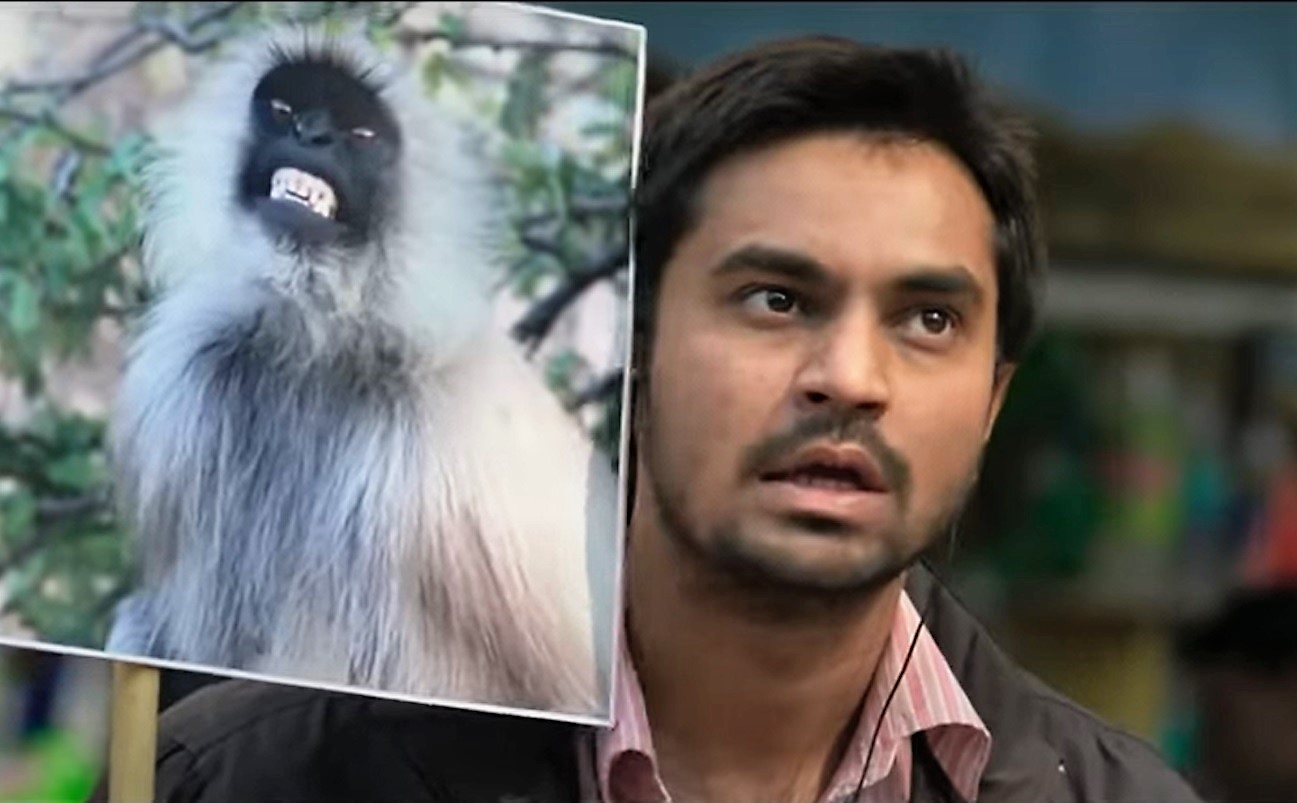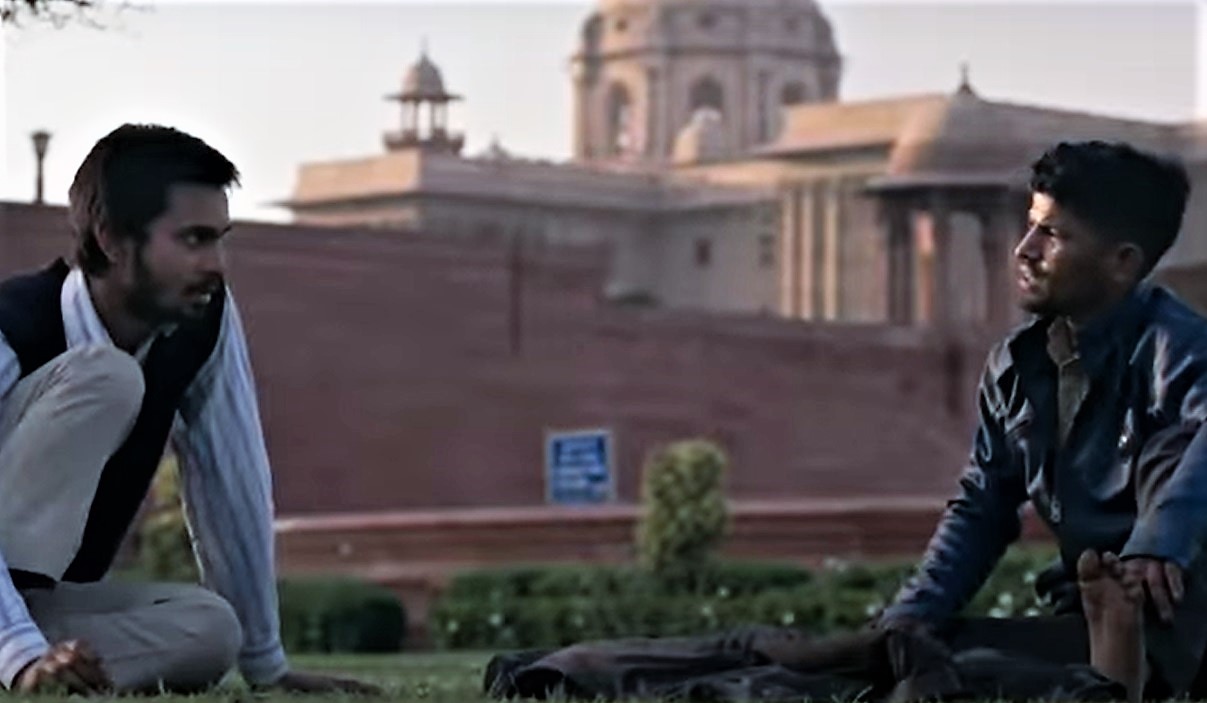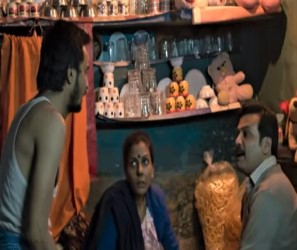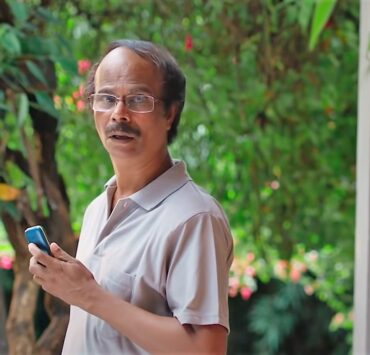EEB ALLAY OOO

Jazeela Sherif is an engineer turned CFO, a painter and…
Eeb, allay and ooo, the three throaty sounds produced in the right pitch, and with the correct timbre, are the tools of a strangely unique job, perhaps, you have never heard about or seen before – the job of driving away the monkeys infesting the boisterous streets of Delhi and its monumental sarkari1 buildings fortified by gun wielding policemen. The protagonist is a man at the job, who is part of a contractor’s team appointed by the government. Prateek Vat’s debut is a satire that will hit right on the face of your conscience for its crude honesty in telling the story of the marginalized society, living on the other side of the charming Lutyens’ Delhi and elegant Raisina Hills.
FILM SENSE aims only to give a brief idea about the film and its significance – socially, and as a work of art. We write about a film here because it deserves attention.
Anjani is a migrant and a fresh recruit to a contracting firm engaged in the monkey repelling business. Mahinder, his senior at work, trains him to produce the three sounds to shoo away the animal intruders. The top government officers of the country are the most affected in this imbroglio, which makes the job even more tricky for the guys who have to do the embarrassing vocal exercises amidst amused spectators glancing at them with a show-me-if-you-can scorn.

Anjani realizes that he is cut out for better things and hates the job. Our evolutionary ancestors, least disturbed by Anjani’s comical actions, mind their business as usual.
The cinematographer Saumyananda Sahi‘s camera captures their smug reactions in close shots as they stay put in proprietary locales quite fearlessly.
In one of the beginning shots, a mom and baby monkey duo are shown sliding down a heavily barbed-wire wrapped pole quite deftly without getting hurt at any point. This signals the central theme of the movie, and is as strange as the three worded title. Monkeys wandering freely around the architectural splendor and the apex institutions is certainly annoying for the people engaged in the serious jobs of managing the second most populous country in the world. Keeping the animals at bay is as serious as the jobs that these babus2 do; but does it matter how it is done or who does it?
Why animals encroach human habitats is only a topic of the brief orientation Anjani receives. Anjani’s ludicrous and unsuccessful attempts to chase away the beasts, in the way he was briefly trained, do not evoke even a giggle from you once you plunge along with him into his do or perish predicament in a ruthless world around him. As a near illiterate, he is left with no other choice but to stick to the ridiculous occupation. In under one hour, the movie documents multiple faces of the metro, mired in conflicts of all sorts, bordering on absurdity that no one questions – mostly of the apathetic approach of his managers towards hardships of ordinary people.
Anjani has to deal with the clever, agile and nonchalant primates that have learned all your tricks. They reign the VIP habitat unchallenged, with a sense of full entitlement to the space it occupies, in sharp contrast with Anjani’s agony of having to put up with a square space he shares with his temperamental sister and her husband.

Indifference and stubbornness of his superiors and the archaic method of doing this odd job frustrate him. His sister, who accommodates him in her measly space in the migrant ghetto, would not entertain his excuses to shun the job, for she and her husband are only a tad better than him in their existential struggle. Anjani is unable to get his shrieking to perfection unlike Mahinder who he considers a born artist in the field. In one of the metaphorical scenes, he begs his jeering fellow workers to free him from a mock up monkey trap.
On the brink of losing his job, he devices a new technique with the help of his neighbour girlfriend. This is effective in his job of driving away monkeys, but the respite is short lived, as his boss and the sarkari babus aren’t amused by the innovative idea. The officers always have the unquestionable standard operating procedures and he simply has to follow their instructions. As long as there are voiceless humans whose lives matter very little, the people in power would use them as they want, leaving no room for creativity or challenging the status quo. The rank and file imbibe this culture once they are in the system – not applying the mind but continue using stop-gap solutions even for perennial problems.
During the republic day parade, the officers assess the danger of the shameful presence of apes around the dignitaries and take precautionary measures. But, at any point in time, no one wants to address the root cause, or experiment anything new for fear of subverting the system. The monkeys quickly withdrawing as they see the furries in langur costume in one of the floats in the parade is a triumphant moment for Anjani; a silent recognition of his discovery and a pat on his battered ego. We realise that it is not his misfortune that interferes with his life and drives him to a revelation of sorts shrouding all that seems logical even to an illiterate person, but irrationalities cloaked in ‘this is what we are’ bandwagon.
A city with thirty million population, of all hues and beliefs, living in a mostly smog covered atmosphere – can it afford to allow animals that can cause harm roaming around disrupting peaceful life? Well, the film lets you feel the fear and confusion, will drag you into the cesspool of political, religious and socio- economic trappings, quite allegorically, portraying the situation we are in and leave you confounded with the illogicality of it all.

Religious reverence to animals has caused undomesticated animals to thrive in human habitats in many parts of the country. There is narrow difference between the status of humans and animals, with both terrorizing each other in their own ways when the limit of tolerance is infringed. This happens quite frequently too.
Anjani’s dutiful reminder of rules on prohibition of feeding animals in city limits attracts the wrath of a senior government official trying to feed the monkeys on a regular basis. He flaunts his credentials, leaving the problem and the solution cancelling each other, and dropping you back exactly at the point zero.
The film is rich in metaphors – humans living valueless lives driven to the point of animal like existence, the lives that are impervious to those living on the fringes, the elite who casually party outdoors undisturbed by the shrieky ‘eeb allay ooo’ calls, the frenzied constellation of absurdities imposed or accepted as reality, the indifference of sarkari babus behaving like gods, their apathy to human struggle, imposition of ridiculous and impractical job design on unassuming migrant workers – the list is long!
Imagine the risk of a mostly untrained security guard carrying an unwieldy gun all the way from workplace to his home through a maze of winding paths of an over populated slum. This is the longest scene in the movie, probably, the most biting, as your empathy is already with his malnourished pregnant wife who abhors the gun’s ominous presence around. Life moves on a thin thread as she is also a victim of a cut-throat sales intermediary, who thinks she has no right to have a baby with her paltry income.
Shardul Bharadwaj pulls out a remarkable performance as the reluctant monkey repelling guy. The characters in the sub plots of a wider canvas in which the story is told have been selected carefully. This is the sort of movie everyone should watch, but be ready to be nudged at your conscience by the cruel joke that it is, unfolding as natural as it can be, both dull and bright, but in true colors. If some of the remnant muck splashes on our faces, it is not accidental.
(EEB ALLAY OOO, Hindi, 2019. Available on Netflix from February 2021)
(NOTE: All images are sourced from the official trailer of the respective movies and are hereby acknowledged. Pictures help the readers to connect easily with the story hint, and are used with the good intention of promoting the work. Objections, if any, from the owners of the productions, shall be communicated through the contact form, upon which the pictures used will be removed)
- Hindi word for governmental
- A colloquial usage in India for officers
What's Your Reaction?
Jazeela Sherif is an engineer turned CFO, a painter and a trained singer. Besides engineering, she holds an M.B.A, PhD, and an MSc in Financial Engineering.





